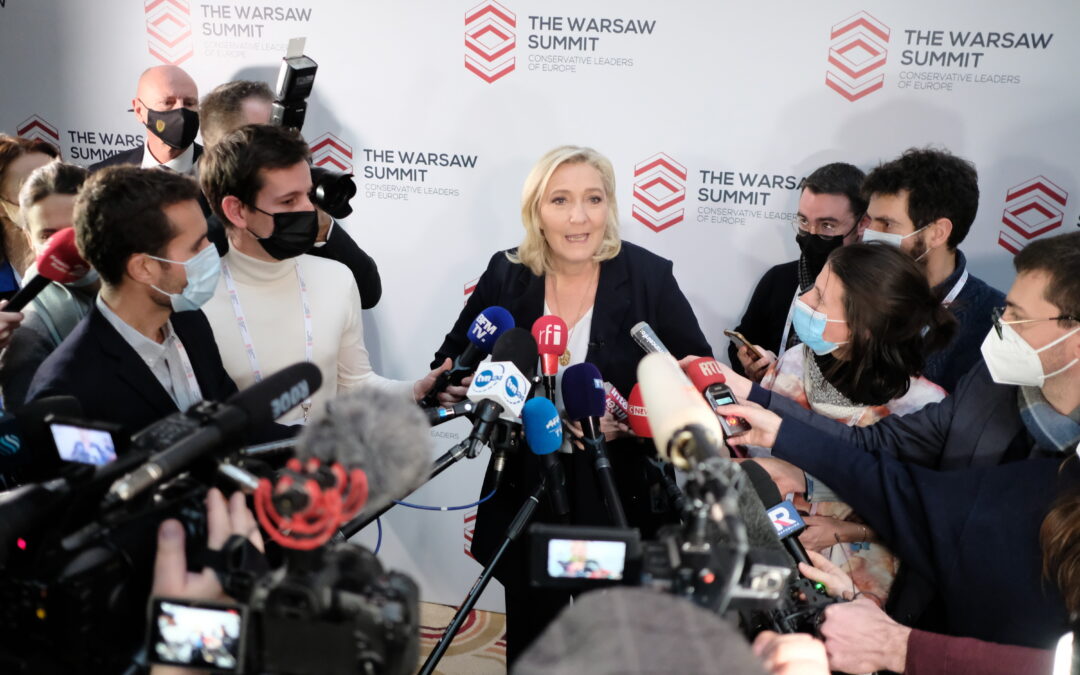By Aleks Szczerbiak
Poland’s right-wing governing party appears to believe that the EU political establishment is becoming irredeemably hostile to it, and that it needs to seek out allies that share its view of the European integration project. But there may be short-term political costs to building links with radical Eurosceptic parties that have pro-Russian sympathies and are less influential within the EU institutions.
Right-wing Eurosceptic parties meet in Warsaw
At the beginning of December, the right-wing Law and Justice (PiS) grouping, Poland’s ruling party since autumn 2015, hosted the so-called Warsaw Summit, a high-profile meeting of conservative and right-wing Eurosceptic parties.
These parties are currently split between two main factions in the European Parliament (EP). PiS is a member of the European Conservatives and Reformists (ECR), the sixth largest EP grouping which also includes: the Brothers of Italy (FdI), Spanish Vox party and Czech Civic Democrats (ODS). (Prior to the UK’s withdrawal from the EU the British Conservative party was also a member.)
The grouping was formed in 2009 as a platform to promote policies associated with the European conservative political tradition distinct from the more centrist and federalist European People’s Party (EPP), which has its origins in Christian Democracy, and the radical right Identity and Democracy (ID) grouping. Since the 2019 EP elections, PiS has been the dominant force in the European Conservatives and Reformists, comprising 24 of its 62 MEPs.
The Warsaw Summit was part of a broader effort to consolidate different sections of the European right by building stronger ties between PiS and some of the parties that comprise Identity and Democracy. Some commentators see this as a precursor to the creation of a strong new pan-European party family.
In addition to PiS leader and Polish deputy prime minister Jarosław Kaczyński, the most prominent politicians present at the summit were Hungarian prime minister Viktor Orbán – whose Fidesz party is PiS’s closest European ally, and has been looking for a new EP home since it left the European People’s Party in March – and French National Rally (RN) leader and presidential candidate Marine Le Pen.
The summit followed an earlier, well-publicised October meeting between Le Pen and PiS prime minister Mateusz Morawiecki in Brussels, her first with an EU state leader. Morawiecki also hosted a dinner for Le Pen immediately prior to the Warsaw Summit.
Taking risks to find allies
This rapprochement between PiS and Le Pen’s grouping marks a change of heart by Poland’s ruling party and follows years of antagonism between the two, despite them agreeing on issues such as national sovereignty and multiculturalism.
PiS previously avoided cooperation with the National Rally – and, indeed, other parties in Identity and Democracy – because of major disagreements over their respective approaches to relations with Russia.
The Polish ruling party has been at the forefront of efforts to persuade the Western international community to develop a common, robust response to what it sees as Russian President Vladimir Putin’s neo-imperialist destabilisation of central and Eastern Europe; and specifically to ensure that EU sanctions on Moscow are maintained and extended.
Indeed, PiS sees Poland as playing the role of regional leader standing at the head of a broad coalition of post-communist states to counter Russian expansionism. Le Pen, on the other hand, has been much more accommodating towards Putin and in the past her party has received financial support from Russian banks.
Le Pen’s pro-Kremlin views provoked further controversy when, in an interview with the Rzeczpospolita newspaper immediately prior to the Warsaw Summit, she suggested that it was the EU that had played a destabilising role in Ukraine because this was part of Russia’s sphere of influence.
As a consequence, Polish opposition parties strongly criticised PiS for developing cooperation with Le Pen and other radical right parties with strong ties to Moscow.
PiS countered by arguing that it did not share Le Pen’s views on relations with Putin, but that in terms of practical policy preferences she was no more pro-Moscow than many European centre-right and centre-left parties with whom the Polish opposition was closely allied. Their leaders, PiS said, had business interests in, and close economic ties with, Moscow, citing a number of politicians from these parties who had taken jobs with Russian firms.
Indeed, PiS argued that the most pro-Moscow project currently underway in Europe was the Nord Stream 2 gas pipeline supported by outgoing German Christian Democrat Chancellor Angela Merkel.
PiS is hoping that little of this opposition criticism will actually cut-through to ordinary Poles. Moreover, it is clearly prepared to risk some potential domestic political blowback from such cooperation because the party feels that it needs allies to advance its project of fundamentally reforming the EU.
PiS wants the EU to return to what it sees as its original role as a looser alliance of economically co-operating sovereign member states with a more consensual decision-making process. The departure of the British Conservatives from the EU means that PiS lacks allies on the mainstream centre-right for such a project and hence needs to build closer ties with radical-right Eurosceptic parties in spite of their pro-Moscow sympathies.
Is Law and Justice’s “twin-track” EU strategy still viable?
PiS also appears to believe increasingly that the EU political establishment has become irredeemably hostile to it. Although PiS has often been labelled as Eurosceptic, up until now the dominant view within the party was that it could achieve its objectives by pursuing a “twin-track” approach to EU relations.
On the one hand, it accepted that there will be disagreements with the EU political establishment on moral-cultural issues where PiS’s attachment to traditional morality and national identity stand in stark contrast to the socially liberal, cosmopolitan consensus that predominates among West European cultural and political elites.
It felt that policy clashes with the major EU powers were inevitable because Poland often had interests that conflicted with the dominant Franco-German axis, and PiS was, the party claims, pursuing a more robust and assertive approach than its predecessors.
The party also recognised that the EU political establishment largely agreed with the Polish opposition and legal establishment’s argument that PiS’s judicial reform programme undermined democracy and the rule of law; a claim that it strongly contests.
At the same time, however, PiS has tried to present Poland as a positive and constructive member of the union, and de-couple disagreements over issues such as rule of law compliance from attempts to develop closer economic ties and normal pragmatic working relations between Warsaw and the EU political establishment on bread-and-butter policy issues.
However, the EU political establishment’s recent moves to link the disbursement and management of Union funds to rule of law compliance represents a major challenge to PiS’s “twin-track” strategy.
For example, the European Commission has delayed approval of Poland’s draft national recovery plan (KPO), without which it cannot access the first tranche of billions of euros that it is due from the EU’s coronavirus recovery fund, until Warsaw complies with a July EU Court of Justice ruling calling for the suspension of a newly created disciplinary chamber of the Polish supreme court.
The commission also appears to be planning to trigger a new EU conditionality regulation that allows it to withhold payments from both the coronavirus fund and the Union’s regular 2021-27 budget, from which Poland is set to be one of the largest beneficiaries, if perceived rule of law breaches can be shown to have directly endangered the proper use of these funds.
The regulation’s implementation has been delayed pending a challenge to its legality in the EU Court by Poland (and Hungary), with a ruling expected in early 2022.
PiS argues that rule of law conditionality is a political instrument based on vague and arbitrary criteria and lacks a legal basis in the EU treaties. It says that it could be used by the EU political establishment to curb national sovereignty and interfere in almost every sphere of public life by, for example, exerting pressure on PiS to abandon its radical systemic reforms and accept liberal-left moral-cultural norms.
The party thus appears to be coming to the view that the EU cultural liberal-left consensus is hegemonic and powerfully entrenched. Consequently, it feels that the EU political establishment will continue to use the rule of compliance dispute and the union’s legal framework, specifically European Court rulings, to further advance European political integration and federalism by stealth, and marginalise and undermine right-wing conservative groupings committed to traditional values and national identity such as PiS.
Missing leaders and no new EP grouping
However, there are still major question marks hanging over future plans for a new pan-European right-wing Eurosceptic party grouping. Firstly, the significance of the Warsaw Summit was undermined by the fact that not all of the leaders of parties that PiS hoped would join such a new initiative were present.
Among notable absentees were the leaders of the two large Italian radical right parties: Italy’s Matteo Salvini from the Lega – who was one of the signatories of an earlier July declaration by sixteen right-wing parties and movements, including PiS, apparently laying the ground for a new Eurosceptic EP grouping – and Brothers of Italy leader Giorgia Meloni.
Czech Civic Democrat leader and prime minister Petr Fiala – who is the only other politician from among these parties apart from Morawiecki and Orbán to head up an EU government – also failed to attend. Moreover, although the summit discussed closer co-operation between the respective parties within the EP, including aligning votes on sovereignty and immigration issues, and they agreed to meet every two months to continue talks on the project, there was no mention of forming a new common pan-European political grouping.
At the same time, PiS does not itself appear sure how exactly it wishes to proceed with this project, and particularly how it relates to the extant European Conservatives and Reformists grouping.
On the one hand, trying to carve out a distinctive, ideologically pure conservative EP grouping may come across as an indulgence when the most important issue facing the Polish ruling party seems to be finding as many allies as possible with a shared vision of the future of the European integration project.
Indeed, if all the parties involved in the putative new European right-wing party family were to combine their forces this could, according to various reports, make them the third or even second largest EP grouping after the European People’s Party.
On the other hand, PiS remains hesitant about abandoning the European Conservatives and Reformists for a speculative new grouping because its de facto leadership of the former provides it with practical advantages and short-term pay-offs within the EP. PiS would have to compete for leadership of the new EP grouping on more equal terms with large parties such as the French National Rally and Italian “League”.
Moreover, the Identity and Democracy grouping and its member parties have been largely isolated in the EP and its committees by parliament leaders, who do not want their views filtering into legislation and reports. At the same time, the (apparently less politically toxic) European Conservatives and Reformists remains attractive as a potential EP ally for mainstream groupings such as the European People’s Party.
Whatever the longer-term strategic considerations, a formal link-up with more radical pro-Moscow parties, therefore, not only risks domestic political costs but could actually lose PiS influence within the EP in the short term.
Main image credit: Slawomir Kaminski / Agencja Wyborcza.pl





















